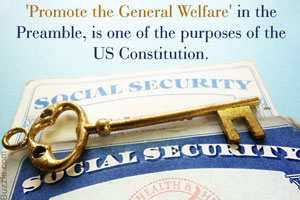 Welfare, or the well-being of the populace, is the aim of every nation. As we speak of the core values and notable constitutional ideals including liberty, equality, and justice, welfare comes as a part of the list. The concept of ‘welfare-state’ indicates an even larger role of the government in attaining and promoting the economic and social well-being of the people.
Welfare, or the well-being of the populace, is the aim of every nation. As we speak of the core values and notable constitutional ideals including liberty, equality, and justice, welfare comes as a part of the list. The concept of ‘welfare-state’ indicates an even larger role of the government in attaining and promoting the economic and social well-being of the people.
Welfare in the United States came to be mainly associated with welfare measures set about by the government during and after the Great Depression in the 1930s. The domestic programs undertaken for the relief of the unemployed and poor by the then President Franklin D. Roosevelt were known as ‘New Deal’.
Meaning of ‘Promote the General Welfare’
Promoting the general welfare is an expression seen in the written constitutions of many sovereign states. Stated as a basic guideline, it usually indicates that the governing authority, as mentioned in the (constitutional) document, will have the power to make such laws which would promote the general welfare of the people. It is also found as a foundational principle in certain laws, or charters made by governments, international organizations, and other documents.
As we can broadly understand from the words ‘promote’ and ‘welfare’, it is something that brings about the welfare of the entire citizenry. It is thus, also sometimes referred to as public welfare. It may then be interpreted as a basis for such legislation that promotes health, safety, morality, peace, and overall well-being of the people.
As far as the Constitution of the United States is concerned, the phrase finds mention in the Preamble and in Article I, Section 8. Let us try to understand its meaning accordingly.
In Preamble
“We the People of the United States, in Order to form a more perfect Union, establish Justice, insure domestic Tranquility, provide for the common defense, promote the general Welfare, and secure the Blessings of Liberty to ourselves and our Posterity, do ordain and establish this Constitution for the United States of America.”
Here, it appears as one of the primary reasons or purposes behind the Constitution. However, as ruled in Jacobson v. Massachusetts, “it [the clause in the Preamble] has never been regarded as the source of any substantive power conferred on the Government of the United States or on any of its Departments”.
In Article I, Section 8
“Congress shall have power to lay and collect taxes, duties, imposts and excises, to pay the debts and provide for the common defense and general welfare of the United States; but all duties, imposts and excises shall be uniform throughout the United States;…”
With respect to this clause, there were two opposing interpretations made by James Madison and Alexander Hamilton. Madison had a narrow understanding of the powers conferred upon Congress by this clause, as limiting them only to the duties specifically listed in the clause further. Hamilton, on a different note, viewed it to be the substantive power of Congress to tax and appropriate, which would be limited only by the requirement that the power would be exercised for the general welfare of the nation. This latter view was also later upheld by the Supreme Court in United States v. Butler.
The intent behind the phrase is better understood from the words of Thomas Jefferson,
“[T]he laying of taxes is the power, and the general welfare the purpose for which the power is to be exercised. They [Congress] are not to lay taxes ad libitum for any purpose they please; but only to pay the debts or provide for the welfare of the Union. In like manner, they are not to do anything they please to provide for the general welfare, but only to lay taxes for that purpose.”
Also, as mentioned by Justice Joseph Story in United States v. Butler, the ‘general welfare clause’ is not a grant of general legislative power, but a qualification on the taxing power.
Welfare Activities
Public aid and assistance initiated from the government’s side, like social security, minimum wage laws, medicare, and assistance during disasters are examples of welfare activities undertaken by the state. Existence of collective bargaining and regulation of the financial markets also count as measures to achieve a balanced and all-inclusive economic development.
A more specific example would be of a tax levied by the state to build and maintain a system of public education in the country. Tax paid by an individual would naturally not amount to his/her personal welfare directly. However, a sound educational system is significant in sustaining a better economic environment, which is ultimately at the base of any personal welfare. This explains the idea of general welfare.











RSS